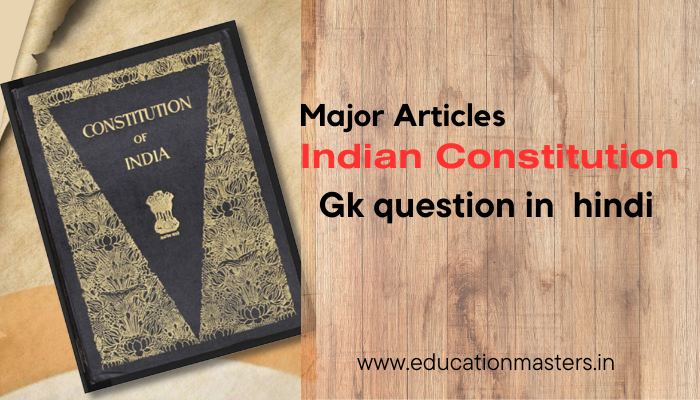Nature of the indian constitution
By Aditya pandey | General knowledge | Sep 28, 2019

In this article, we are explaining the nature of the Indian Constitution. This topic comes in all types of law exams if you are preparing for any type of law exams you should study these facts about the Indian Constitution. constitution of India is the longest constitution of the world. To gain knowledge about the Indian Constitution you can refer this article to know more.
Nature of the Indian constitution:-
The government and hence the constitution are of two kinds federal in which the government power is divided between the general or central government and the regional or state government in such a way that what is given to one is denied to other and vice versa so that each is within sphere co-ordinate and independent and unitary in which the power is centralised in general or central government and the regional or provincial government are subordinate to it
As demonstrated by K.C. The nearness of co-ordinate pros self-ruling of each other is the centrality of the administrative rule. Group in India doesn't include comfort, anyway one of rule.
Federal features:-
The constitution of India modifies the federal principle in such a way that though normally and essentially federal it can assume quite unitary character when exigencies of the country so require.
(i) Distribution of power: A federal constitution defines and demarcates the sphere of the central and the state governments. Each government has to act within its own sphere and can not encroach upon the other’s field.
(ii) A written constitution: A federal constitution should almost necessarily be a written constitution. Distribution of power can not be made orally. It must be done by a written document which is known as the constitution so as to avoid disputes.
(iii) the supremacy of the constitution: In a federal system, the constitution considered the supreme law of the land, all organs and the institutions of the state derive their powers from the constitution and have to functions within the limit defined by it.
(iv) Authority of the court: The court in the federal constitution has the final authority to interpret the provisions of the constitution and maintain the supremacy of the constitution. The judiciary decides disputes between the states and centre and its decisions on such disputes are final.
(v) Rigidity:-
The constitution possesses all the essential characteristics of a federal constitution mentioned above. It is a written constitution. there is a division of power between the centre and states. The constitution of the india is the supreme law of the land. The procedure for amending the provisions of the constitutions which deals with its federal character is difficult from some provisions, it is same as for ordinary enactments
Unitary federal:-
In a sense the Indian union is federal but the extent of federalism in it largely watered down by the needs of progress and development of a country which has to be nationally integrated intellectually and spiritually uplifted.
The Indian constitution has the following federal features:-
1 Appointment of the governor
2.Parliaments power to form new states and other boundaries of existing states.
3.Emergency provisions
Nature of the Indian constitution:-
The government and hence the constitution are of two kinds federal in which the government power is divided between the general or central government and the regional or state government in such a way that what is given to one is denied to other and vice versa so that each is within sphere co-ordinate and independent and unitary in which the power is centralised in general or central government and the regional or provincial government are subordinate to it
As demonstrated by K.C. The nearness of co-ordinate pros self-ruling of each other is the centrality of the administrative rule. Group in India doesn't include comfort, anyway one of rule.
Federal features:-
The constitution of India modifies the federal principle in such a way that though normally and essentially federal it can assume quite unitary character when exigencies of the country so require.
(i) Distribution of power: A federal constitution defines and demarcates the sphere of the central and the state governments. Each government has to act within its own sphere and can not encroach upon the other’s field.
(ii) A written constitution: A federal constitution should almost necessarily be a written constitution. Distribution of power can not be made orally. It must be done by a written document which is known as the constitution so as to avoid disputes.
(iii) the supremacy of the constitution: In a federal system, the constitution considered the supreme law of the land, all organs and the institutions of the state derive their powers from the constitution and have to functions within the limit defined by it.
(iv) Authority of the court: The court in the federal constitution has the final authority to interpret the provisions of the constitution and maintain the supremacy of the constitution. The judiciary decides disputes between the states and centre and its decisions on such disputes are final.
(v) Rigidity:-
The constitution possesses all the essential characteristics of a federal constitution mentioned above. It is a written constitution. there is a division of power between the centre and states. The constitution of the india is the supreme law of the land. The procedure for amending the provisions of the constitutions which deals with its federal character is difficult from some provisions, it is same as for ordinary enactments
Unitary federal:-
In a sense the Indian union is federal but the extent of federalism in it largely watered down by the needs of progress and development of a country which has to be nationally integrated intellectually and spiritually uplifted.
The Indian constitution has the following federal features:-
1 Appointment of the governor
2.Parliaments power to form new states and other boundaries of existing states.
3.Emergency provisions
सरकारी नौकरियों, जीके अपडेट्स और करेंट अफेयर्स की ताज़ा जानकारी सबसे पहले पाने के लिए:
-
हमारे WhatsApp चैनल को फॉलो करें:
https://whatsapp.com/channel/0029Vb6sjZz0wajwDXcd5B0U -
हमारे Telegram चैनल को फॉलो करें:
https://t.me/educationmastersin -
हमारे Facebook Page को फॉलो करें:
https://www.facebook.com/educationmastersindia
Share this Post
(इस पोस्ट को अपने दोस्तों के साथ शेयर करना ना भूले)Posts in Other Categories
Latest Posts
Top 10 Longest Rivers in the World | Length, Ori ...
Feb 05, 2026
JEE Main 2026 Session 1 Answer Key Out @ jeemain ...
Feb 04, 2026








.jpg)
.jpg)

